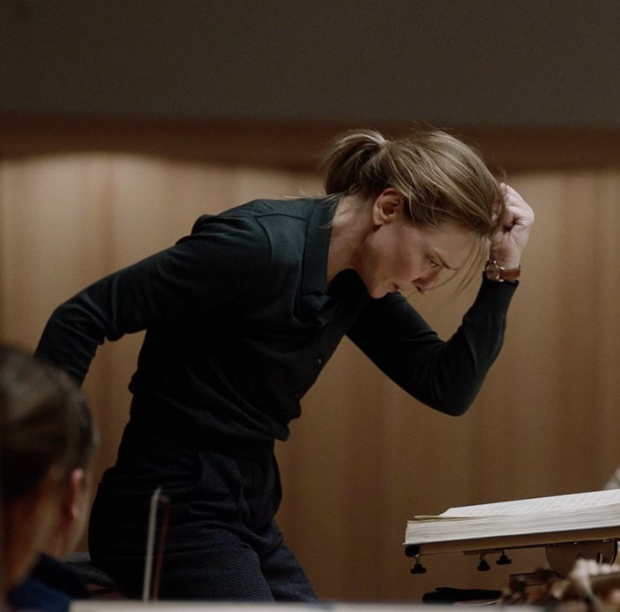Todd Fields’ “TÁR” Cancels the Conductor’s Cruelty
On a Manhattan stage at the New Yorker Festival, staff writer Adam Gopnik delineates a resumé-like introduction to the “TÁR” star. Meet Lydia Tár (Cate Blanchett), world-renowned conductor and composer, who ascended from humble beginnings in Cleveland to Boston, New York and now the prestigious Berlin Philharmonic. Her credentials satisfy her lofty career, the Harvard-educated maestro mentored by Leonard Bernstein is also a member of the ultra-exclusive EGOT club, as she has been awarded an Emmy, Grammy, Oscar and Tony award. She has recorded all of the Mahler symphonies but one, and prior to her coveted conversation with Gopnik, she just released her memoir, “Tár on Tár.”
After a roar of applause, Tár finally blesses the stage with her powerful presence and genius, and begins her interview. The opening scene engages in a conversation with the classically trained and educated, seemingly catered to a high-brow audience. But Lydia’s grandiose and apparent genius, thanks to Blanchett’s gripping performance, leaves every viewer absolutely obsessed and enthralled with the character of Tár.
Similar to her professional career as a conductor, much about Tár’s life is controlled and meticulously choreographed. She wears only bespoke, tailor-made suits. She drives a pristine Porsche Taycan, and lives in a breathtaking Berlin apartment with Brutalist interiors. She speaks in perfect German, as revealed in a scene that is both horrifying and electrifying, where she confronts her grade school daughter’s bully, looking down upon the child, muttering, “Ich bin Petra’s Vater (I am Petra’s father).”
Aesthetically, the muted hues integrated with simple, yet profound cinematography (Florian Hoffmeister) create a clean backdrop for the character of Lydia to obtrude against, which establishes a stark and intriguing contrast. The soundtrack produces a similar, suspenseful effect, composing quiet and tense scenes that are interrupted by noisy, orchestral entrances — it is as unsettling as it is jarring. Writer-director Todd Field has so perfectly crafted the world and character of Tár that the film has often been mistaken for a biopic, and Lydia for a real person. But unlike biopics that follow an incredible road to success alongside a victorious rise to fame, “TÁR” follows an anti-heroine’s fall from grace, much to the tune of a Shakespearean tragedy.
As the film progresses, the conductor’s relationships reveal to be complicated. We quickly learn of Lydia’s domestic troubles, as her wife, Sharon (Nina Hoss), always appears tired and somewhat resentful towards her. She is first violinist at the Berlin Philharmonic and her relationship with Lydia shortly began after her appointment as conductor. Lydia’s assistant, Francesca (Noémie Merlant), is fearful, obsessed and enraged by her boss. She has trouble stepping out of her submissive role to advocate for her own musical career, while she hopes to be appointed as the Philharmonic’s new second conductor. Halfway through the tortuous plot, we meet Lydia’s newest “project,” a young Russian cellist, Olga (Sophie Kauer), who peaks Lydia’s interest both on and off the stage, whilst snubbing a solo from the conductor’s wife, disappointing her accordingly.
However, Field has given Tár bigger fish to fry than dramas in the home and in the workplace. The film has been advertised to tackle the twenty-first century topic of “cancel culture,” and personally I think Field has done so in a way that proactively stirs the pot without taking a rash stance that turns a conversation into disrespectful satire. From the onset of the plot, it is hinted that there are rumors surrounding Lydia and her young female collaborators and mentees, focusing in on that of her former student, Krista Taylor (Sylvia Flote), who is apparently suing the conductor for slander by dissuading other orchestras from hiring her. But rather than honing in on a particular stance, the film blurs narratives by rooting its own so deeply in Lydia’s point of view that it eventually settles into a conversation more towards abuse of power.
But Lydia is nonetheless responsible for the consequences of her actions, and her legacy is forever ruined through the abuse of her position. Perhaps the conversation Fields engages is about something separate entirely, with the possibility of being a critique of modern third-wave white “#girlboss” feminism. Tár’s story was never one of “triumph over adversity,” as she was always set up to fail in the male-dominated arena of Western-classical music, with the extra barrier of her status as an openly lesbian woman eventually subjugating her to stereotypical judgement.
In the aggregate, the film is so committed to its noncommittal position on all aspects of political conversation that it serves better as a movie theater lobby conversation starter than evidence for a film studies thesis. The abrupt, non-satisfactory ending provides the exact conclusion that Blanchett and Field wanted to give us: nothing. The 1967 essay by French literary critic Roland Barthes,“The Death of the Author,” argues against relying on the intentions of the author to find a definitive explanation for the “ultimate meaning” of a text. “TÁR” in and of itself is a rejection of an ultimate meaning or argument, as any impressions from the film upon the audience should be subjective. Art is art for the sake of being art, and the art of this film is Blanchett’s magnificent performance, and Todd Field’s convoluted character study of a screenplay.















































































































































































































